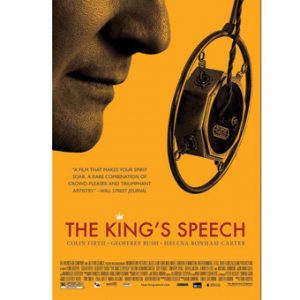The King’s Speech directed by Tom Hooper (Weinstein, 2010)
 In a season of gunslingers (True Grit) and brawlers (The Fighter), Tom Hooper has made a touching film about courage in which no one draws a gun or throws a punch. The fear of public speaking is our most common terror, and it’s much worse when you are not a commoner but the Duke of York and the future King of the British Empire. Every time you step up to a radio microphone, a quarter of the world is listening.
In a season of gunslingers (True Grit) and brawlers (The Fighter), Tom Hooper has made a touching film about courage in which no one draws a gun or throws a punch. The fear of public speaking is our most common terror, and it’s much worse when you are not a commoner but the Duke of York and the future King of the British Empire. Every time you step up to a radio microphone, a quarter of the world is listening.
On his deathbed King George V said his son Albert (Colin Firth) was the bravest person he knew, but from childhood the young Duke and future King suffered from a crippling stutter that repeatedly and devastatingly humiliated him. He also suffered the slings and insults of parents and siblings who sought to drive out this stutter by heaping on even more humiliation. That this modest, decent child managed to grow into a loving spouse and father is itself a small miracle. That he found a friend to help him face and overcome this terror is a wonder indeed.
For this is also a film about an unlikely friendship between two uncommon and quirky men, Albert the stammering prince, and Lionel (Geoffrey Rush) the failed actor. Albert is formal, reserved, and diffident, uninterested in if not incapable of talking about his personal life or entering into any of small social exchanges that make up the rituals of friendship. Lionel is informal, extroverted, curious, often inappropriate, self-taught and self-made, and in his own way, as affectionate as a cocker spaniel.
But there is a chemistry between the friendless Prince living in the shadow of a brother the world adores and the cocky speech therapist daring to address royalty by their first name. These two men, each wounded and noble in different ways, recognize the humanity and dignity of the other, and create a bond of trust that allows the King to face and serve his people in what Churchill called their greatest hour. Hemingway wrote that courage was grace under pressure, but grace is a always a gift of love.














Add comment